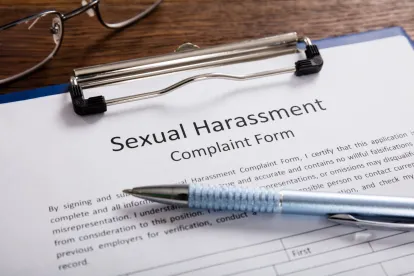On June 18, 2019, Connecticut Governor Ned Lamont signed into law “An Act Combatting Sexual Assault and Sexual Harassment” (“Act”),[1] which includes a number of significant changes to not only Connecticut’s sexual harassment prevention law, but other employment laws as well. Specifically, the Act:
-
expands the sexual harassment training requirements for all employers;
-
requires employers to provide information concerning the illegality of sexual harassment to new employees;
-
increases the penalties imposed on employers for failing to comply with the requirements of posting notice regarding the illegality of sexual harassment and providing sexual harassment training;
-
requires that if any employer takes corrective action in response to an employee’s claim of sexual harassment, such action cannot modify the complainant’s conditions of employment unless the complainant agrees to the modification in writing;
-
expands the definition of “discriminatory practice” to include failure to comply with the required sexual harassment training;
-
extends the deadline for employees to file discrimination complaints of any kind (not just sexual harassment complaints);
-
allows the Connecticut Commission on Human Rights and Opportunities (“CHRO”) to award damages and attorney’s fees to successful claimants;
-
allows a court to award punitive damages in discrimination cases;
-
authorizes the CHRO to enter an employer’s place of business to ensure compliance with the posting, training, and provision of the sexual harassment information mandates and to examine records relating to such compliance; and
-
permits the CHRO to bring a civil action in certain discrimination matters.
The Act will take effect on October 1, 2019, except that Section 3, requiring certain actions by the CHRO, became effective July 1, 2019.
Sexual Harassment Training: Connecticut currently requires employers of at least 50 employees to provide supervisors with two hours of training on state and federal sexual harassment laws. The Act requires employers of three or more employees to provide two hours of training and education regarding sexual harassment and available remedies to all employees by October 1, 2020. However, for newly hired employees hired after October 1, 2019, such training must take place no later than six months after their date of hire (provided the CHRO has developed and made available free online training and educational videos that employers can use to accomplish the training).
Employers of fewer than three employees are required to provide such training and education to all supervisory employees by October 1, 2020, and to any new supervisory employees within six months of the employee’s assumption of supervisory duties (provided the CHRO has developed and made available free online training and educational videos that employers can use to accomplish the training).
Notably, employees who have received sexual harassment training after October 1, 2018, are not required to be retrained. Employers are required to supplement the training to all supervisory and non-supervisory employees not less than every 10 years.
Additional Notice to Employees Regarding Sexual Harassment: Currently, employers of three or more employees are required to post in a prominent location information regarding the illegality of sexual harassment and remedies available to victims of sexual harassment. This mandate remains in effect. In addition, employers of three or more employees must now provide, via email, a copy of information relating to the illegality of sexual harassment and the remedies available to victims of sexual harassment to each employee within three months of hire. The subject line of the email must include the words “Sexual Harassment Policy” or similar words. If the employer has not provided an email account to the employee (or the employee has not provided the employer with an email address), the employer must post the information on its website, if the employer maintains one. Alternatively, employers may comply with this requirement by providing the employee (by email, text message, or in writing) with a link to the CHRO’s webpage concerning the illegality of sexual harassment and the remedies available to victims. The Act directs the CHRO to create such a webpage.
Penalties: If an employer does not provide the required sexual harassment training, post notices, or provide employees with the sexual harassment information, a fine of up to $750 may be imposed upon the employer for its failure to comply with each of the above-mentioned requirements.
Corrective Action and Sexual Harassment Claims: If an employer “takes immediate corrective action in response to an employee’s claim of sexual harassment,” such corrective action (which includes employee relocation, assignment of a different work schedule, or other substantive change to the terms and conditions of employment) may not modify the complainant’s conditions of employment, unless the complainant agrees in writing to the modification. However, the failure to obtain the written agreement is not fatal if the CHRO determines that the action taken was reasonable and not detrimental to the complainant based on the evidence presented in a CHRO charge.
Definition of “Discriminatory Practice”: The subsequent Act amends the definition of the term “discriminatory practice” to include the failure to provide the mandated anti-harassment training. In other words, failure to comply with this new requirement constitutes a violation of the Act and permits an employee to bring an action with the CHRO or in court.
Deadline to File Discrimination Claims: Currently, employees are required to file discrimination and harassment claims with the CHRO within 180 days of the alleged act of discrimination. The Act expands the deadline to file discrimination and harassment claims to 300 days, which is consistent with the deadline to file a charge under federal law with the federal Equal Employment Opportunity Commission. The 300-day deadline for discrimination and harassment claims applies only to allegations of discrimination that are alleged to have occurred on or after October 1, 2019.
Remedies: Currently, a CHRO presiding officer can award only reinstatement and back pay as forms of relief upon a finding of a discriminatory employment practice. The Act expands a presiding officer’s authority to include (i) issuing an order to eliminate the discriminatory employment practice; (ii) making the complainant whole, i.e., determining the amount of damages suffered by the complainant as a result of the discriminatory practice, including the actual costs incurred by the complainant; and (iii) awarding reasonable attorneys’ fees and costs. The amount of attorneys’ fees allowed may not be contingent upon the amount of damages requested by or awarded to the complainant.
Punitive Damages: In 2016, the Connecticut Supreme Court ruled that courts may not award punitive damages in civil suits claiming employment discrimination. Pursuant to the Act, courts may now award punitive damages in such cases.
Inspection: The Act expressly gives the CHRO the authority to grant a designated representative of the CHRO permission to enter an employer’s place of business during business hours to ensure compliance with the posting requirements and to review records, policies, procedures, and training materials maintained by the employer, within the 12-month period following the date of filing a complaint with the CHRO or if the executive director of the CHRO reasonably believes that an employer is in violation of the notice, posting, or training requirements.
Civil Action by CHRO Legal Counsel: The Act permits the CHRO to assign legal counsel to bring a civil action in court instead of an administrative hearing when doing so is in the public interest and the parties mutually agree in writing. The court may grant any relief permitted by law, as well as the CHRO’s attorneys’ fees and costs. The court also may impose a penalty on the employer (not to exceed $10,000), provided such discriminatory practice has been established by “clear and convincing evidence.”
What Connecticut Employers Should Do Now
-
For employers with three or more employees, begin preparations to train your current employees by October 1, 2020, or earlier for newly hired employees. (Smaller employers should do likewise with respect to training their supervisors.) Use the CHRO training materials when they become available or develop or purchase your own training program. Prepare to provide training regarding sexual harassment and remedies available to victims of sexual harassment to all employees within a year from October 1, 2019. Be aware that employees who have received sexual harassment training after October 1, 2018, are not required to be retrained.
-
Review, or draft if necessary, information regarding the illegality of sexual harassment, and ensure compliance with the requirements to provide it to employees or post the information on the company’s website.
-
Train human resources professionals and supervisors regarding (i) the expanded sexual harassment information and training requirements, as well as the new remedies available to victims of sexual harassment, and (ii) the new mandates on taking corrective action, particularly the need to obtain a complainant’s agreement in writing to any change to his/her terms or conditions of employment, even a minor schedule change or relocation to an office near his/her former office.
-
Review, when they become available, the CHRO’s online training and educational videos regarding sexual harassment and the remedies available to victims of sexual harassment.
ENDNOTE
[1] P.A. No. 19-16, which was subsequently amended by P.A. No. 19-93.






 />i
/>i


